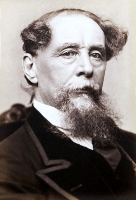阅读chá 'ěr sī · dí gèng sī Charles Dickens在小说之家的作品!!! | |||||||
dí gèng sī yī shēng gòng chuàng zuò liǎo 14 bù cháng piān xiǎo shuō, xǔ duō zhōng、 duǎn piān xiǎo shuō hé zá wén、 yóu jì、 xì jù、 xiǎo pǐn。 qí zhōng zuì zhù míng de zuò pǐn shì miáo xiě láo zī máo dùn de cháng piān dài biǎo zuò《 jiān nán shí dài》( 1854) hé miáo xiě 1789 nián fǎ guó de lìng yī piān dài biǎo zuò《 shuāng chéng jì》( 1859)。 qián zhě zhǎn shì liǎo gōng yè zī běn jiā duì gōng rén de cán kù bō xuē hé yā pò, miáo xiě liǎo gōng rén jiē jí de tuán jié dǒu zhēng, bìng pī pàn liǎo wéi zī běn jiā bō xuē biàn hù de zì yóu jìng zhēng yuán zé hé gōng lì zhù yì xué shuō。 hòu zhě yǐ fǎ guó guì zú de huāng yín cán bào、 rén mín qún zhòng de chóngchóng kǔ nán hé fǎ guó dà de lì shǐ wēi lì, lái yǐng shè dāng shí de yīng guó shè huì xiàn shí, yù shì zhè chǎng “ kě pà de dà huǒ ” yě jiāng zài fǎ guó chóngyǎn。 qí tā zuò pǐn yòu《 ào liè fó · tè wéi sī tè》( yòu yì《 wù dū gū 'ér》 1838)、《 lǎo gǔ wán diàn》( 1841),《 dǒng bèi fù zǐ》( 1848),《 dà wèi · kē bō fěi 'ěr》( 1850) hé《 yuǎn dà qián chéng》( 1861), děng děng。
dí gèng sī shì 19 shì jì yīng guó xiàn shí zhù yì wén xué de zhù yào dài biǎo。 yì shù shàng yǐ miào qù héng shēng de yōu mò、 xì zhì rù wēi de xīn lǐ fēn xī, yǐ jí xiàn shí zhù yì miáo xiě yǔ làng màn zhù yì qì fēn de yòu jī jié hé zhù chēng。 mǎ kè sī bǎ tā hé sà kè léi děng chēng yù wéi yīng guó de“ yī pī jié chū de xiǎo shuō jiā”。
Many of his novels, with their recurrent theme of social reform, first appeared in magazines in serialised form, a popular format at the time. Unlike other authors who completed entire novels before serialisation, Dickens often created the episodes as they were being serialized. The practice lent his stories a particular rhythm, punctuated by cliffhangers to keep the public looking forward to the next instalment. The continuing popularity of his novels and short stories is such that they have never gone out of print.
His work has been praised for its mastery of prose and unique personalities by writers such as George Gissing and G. K. Chesterton, though the same characteristics prompted others, such as Henry James and Virginia Woolf, to criticise him for sentimentality and implausibility.
